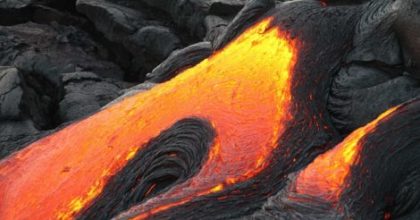
This reflection on the themes of Jurassic World: Fallen Kingdom avoids spoilers, but as always feel free to wait until you’ve seen the movie if you want to know nothing about it when watching.
It is widely reported that an asteroid strike 65 million years ago caused dinosaurs to go extinct, although a variety of hypotheses including widespread volcanic eruptions remain plausible as alternatives. In Jurassic World: Fallen Kingdom, there is no doubt that a single volcano could wipe out the small cluster of de-extinct dinosaurs inhabiting the ruins of two abandoned theme parks. And so congress calls on rockstar “chaotician,” dinosaur survivor and one-man Greek chorus Jeff Goldblum for expert testimony on whether to mount a rescue effort. What they get is a doom-laden sermon delivered as only Goldblum can, through which the film waves at a number of weighty, real-world topics before getting down to the real business of widescreen therapod pyrotechnics.
Still, the film does acknowledge the complexities of the world outside its story, and for that it deserves some credit. It may even provide a convenient conversation starter on a variety of topics. Answers may not be plentiful in the text of the film, but it could be used to break the ice, especially among younger fans who may still be new to these ideas. Here’s a sample of questions the film, especially Goldblum’s monologue, suggests.
- Asteroids and volcanoes fall into the category of “acts of God” with the implication that humans aren’t powerful enough to control them. What kind of God do we imagine if his only acts are the ones we suppose are too big for us? What kind of God do we imagine if his only acts are disasters?
- Ian Malcolm, Jeff Goldblum’s character, denies the involvement of God with a tone suggesting that of course a scientist has no use for such a fantasy. Can you think of any believing scientists in pop culture? How does that reflect or contrast with your experience of actual scientists?
- De-extinction of dinosaurs remains fictional, as we are unlikely to find a suitable source for genomic data. But more recently extinct creatures like the Tasmanian tiger or woolly mammoth make more plausible candidates. If we succeed, should those animals get endangered species protections? Something more rigorous? Or should we not divert resources away from existing populations that are more likely to be adapted to the current world?
- Ian Malcolm compares genetic engineering to nuclear power, allowing the specter of nuclear weapons and power plant failures to loom unspoken. Do you think technologies like CRISPR have the same potential for unintended, or even intended, harm? Do we need to let the facts of genetic engineering speak for themselves without metaphor?
- Just in the past week came the announcement of Neanderthal genes being used to grow “brain organoids”, cultured cells organized with more structure than a single tissue but less than a fully functioning organ like a brain. Do such experiments excite or intrigue you? Do they make you think about ‘playing God’ and all of the implied taboos?
While its treatment if those topics is superficial, Jurassic Park: Fallen Kingdom is not without thematic heft. At the center of its narrative is a question Dr. Frankenstein could have posed: When we create life, do we have an obligation to our creation, or does it have an obligation to us? As you might imagine, our heroes are concerned about what they owe to the dinosaurs while their antagonists would rather consider how the dinosaurs can be exploited for personal gain. Such questions touch on concerns about how we treat the animals we breed for food, the expectations we place on students and younger generations, and how we think about God’s interactions with us.
What questions did the film raise for you? Were you encouraged by any of its answers, or did it fall short? Feel free to share you thoughts on any of the topics above in the comments below.
We’re about 1 month away from the annual meeting of the American Scientific Affiliation at Gordon College. I’ll be there, and I hope to see you there too. If you are a student in the Massachusetts area, you’ll want to take notice of the one-day combo ticket just for students, which adds meals including a clambake dinner and the evening Francis Collins lecture to your free student registration for just $25 (more details here). Saturday will also feature special student-focused sessions organized by the Emerging Scholars Network. And if you’re not local, check out the travel scholarships and lodging & meal scholarships ASA has available for students.
And if all that wasn’t enough, I’m going to sweeten the deal a little more. The student group that brings the most students to the ASA meeting on Saturday will get 3 signed copies of my new book Faith across the Multiverse. Speaking of which, here’s a trailer I made to help get the word out. Feel free to share it with your fellow students so they know what’s at stake. 🙂
Andy has worn many hats in his life. He knows this is a dreadfully clichéd notion, but since it is also literally true he uses it anyway. Among his current metaphorical hats: husband of one wife, father of two teenagers, reader of science fiction and science fact, enthusiast of contemporary symphonic music, and chief science officer. Previous metaphorical hats include: comp bio postdoc, molecular biology grad student, InterVarsity chapter president (that one came with a literal hat), music store clerk, house painter, and mosquito trapper. Among his more unique literal hats: British bobby, captain’s hats (of varying levels of authenticity) of several specific vessels, a deerstalker from 221B Baker St, and a railroad engineer’s cap. His monthly Science in Review is drawn from his weekly Science Corner posts — Wednesdays, 8am (Eastern) on the Emerging Scholars Network Blog. His book Faith across the Multiverse is available from Hendrickson.

Leave a Reply